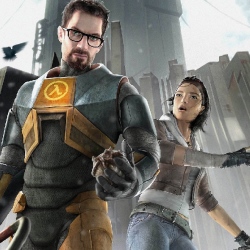
Gabe Newell has been the de facto face of PC gaming for years. But now the Valve CEO is the face of one of the greatest threats Microsoft is facing to its Windows PC business.
Valve chief Gabe Newell built up a full head of steam over how Microsoft was running the Windows gaming ecosystem. So his company, the maker of the Steam digital game distribution service (with 65 million in its community), decided to make its own Linux-based Steam Machines.
The Steam Machines are living room gaming computers aimed at preserving the openness and innovation of the PC, and they represent a potential threat to Microsoft’s decades-long grip on the Windows PC and Windows gaming.
In a rare appearance at a press conference ahead of the 2014 International CES tech trade show in Las Vegas, Newell (who also appeared at Intel’s press conference, in a sign the PC industry is embracing Steam) explained why Valve, a Bellevue, Wash.-based company with just 300 employees, has taken the trouble to create the Steam OS operating system and the Steam Controller and licensed its designs to its Steam Machine partners.
Valve announced 13 hardware partners, including Dell’s Alienware division, a noted gaming PC brand. And Newell prefaced that introduction with an explanation.
“So this has been a great year for the PC,” he began. “We’re up to 65 million accounts on Steam, we have 6 million people [simultaneously online]. I think with the holiday season just passed, we’re about 62 percent year-over-year revenue growth. My favorite statistic is that Dota 2 [the multiplayer strategy game] is bigger than Monday Night Football.”
He added, “So, why? We’re just one company in the PC space. Why are we seeing this continued growth? Why are we seeing users and games and hardware development? We attribute it to the openness of the platform. The PC is successful because we’re all benefiting from the competition with each other. If Twitter comes along, our games benefit. If Nvidia makes better graphics technology, all the games are going to shine. If we come out with a better game, people are going to buy more PCs. That has been the engine of this growth.”
